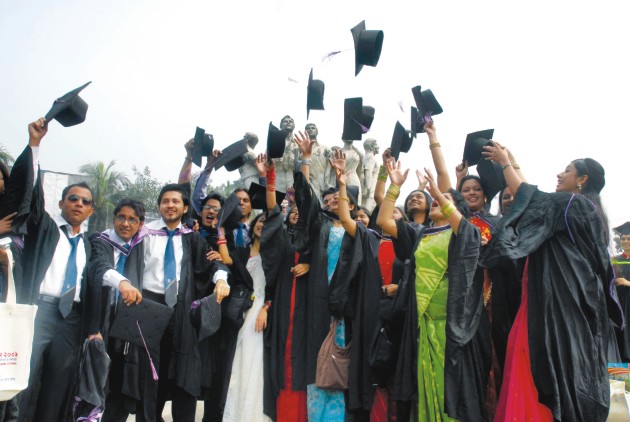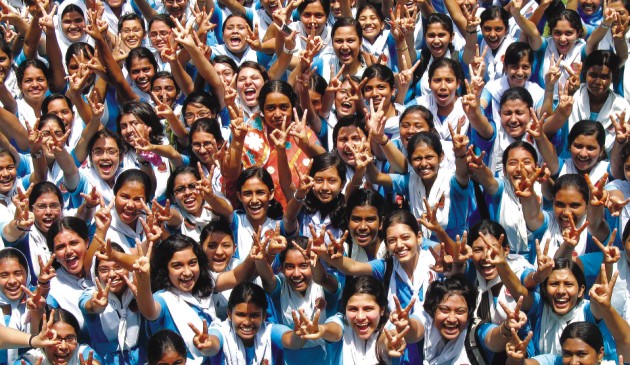
Inside
|
The Need to Know Bangladesh needs to beef up its research capabilities, argues Ahmed A. Azad
AS a poor country with very limited natural resources, and at the frontline of human induced environmental challenges, Bangladesh has to make the most of the intellectual capacity of its own people to develop into a middle-income country. For this, Bangladesh needs to build an indigenous science and technology capacity that is adequate and appropriate to meet its own development objectives. This is not possible without excellence in higher education and goal-oriented internationally competitive research underpinned by a strong and effective foundation in primary, secondary and vocational education whose curricula is specifically designed for national development. Free and compulsory primary education (and if possible secondary education) is a right of our next generations. It is the duty of the government, and the private sector that employs young workers, to provide vocational training to school leavers (after primary or secondary education) who opt not to proceed to higher education because of academic, financial or other personal reasons. This will not only provide countrywide youth employment but also produce the semi-skilled and skilled workforce that is acutely needed for national development. Vocational education should also include the training of primary health care providers such as nursing assistants and paramedics for the thousands of community health centres throughout the country. A good salary structure and social acceptance of technology-oriented and primary health care jobs as financially rewarding and respectable professions will lessen the pressure for places in institutions of higher learning. Without doubt the production of technically skilled workers will be much more beneficial for them, personally and for Bangladesh, than the mass production of college and university graduates who are inadequately prepared for the workforce. The above transformation will require the government to establish an adequate number of vocational and technical training centres throughout the country and also provide sufficient numbers of properly trained and reasonably remunerated teachers for educational and training institutions throughout the country. Without a good salary and living conditions, adequately trained graduates are not likely to be attracted to teaching positions, especially outside the major metropolitan areas. If larger numbers of secondary school leavers could be persuaded to opt for vocational training then the savings made from reduced numbers of highly subsidised undergraduate positions would allow it to be used much more strategically to produce not only doctors, engineers and agricultural specialists but also essential professionals required for specific administrative, development and service sector jobs. A case in point is the production of large numbers of properly trained teachers for primary, secondary and technical institutions. A substantial number of undergraduate seats could be reserved for training teachers of science and technology subjects at various levels. Additional undergraduate positions could be created for training larger numbers of allied health professional such as graduate nurses, physiotherapists and medical technologists. A four year Bachelors degree is expected to produce graduates better prepared for the workforce and to obviate the need for a Master's degree as the minimum entry point for most administrative and management positions. In preparation for a multitasking work environment the first three years could consist of a multidisciplinary courses followed by a fourth year of specialisation in a particular discipline. The brightest students with the best results in the first three years could opt to complete in the fourth year for an Honours degree, preferably with a research component, to prepare them for postgraduate education and training (through research) with a view towards a career in academia or research. While it is an obligation of the state and higher educational institutions to produce graduate professionals for the economic, agriculture, health and administrative sectors, access to postgraduate education and research should not be seen as an automatic right; as the large scale production of Master's degrees in subjects unrelated to job requirements, as is the norm now, is a waste of national resources. In a poor country like Bangladesh, postgraduate research cannot merely be a vehicle for satisfying intellectual curiosity but must deliver tangible benefits for the nation and it's people. Preferably postgraduate education should be available only to the brightest students dedicated to goal-oriented research for which they should be provided reasonable scholarship and facilities. With over 70 universities, large numbers of university teachers with PhD degrees, thousands of research students, numerous centres and institutes (with about 30 in Dhaka University alone), [post-graduate research in Bangladesh should be thriving.] Moreover, Bangladesh publishes over 300 research journals (with 20 from Dhaka University alone), an amazingly large number for a nation that is classified as a least developed country! Besides researchers in academia, Bangladesh also has a very large number of full time researchers in non-university research organisations. It is, therefore, surprising why in the publications index Bangladesh ranks lower than other least developed countries such as Sudan. This together with the woeful international ranking of even our best universities should prompt us to seriously contemplate the importance of quality and relevance, over quantity, in scientific research conducted in Bangladesh. Instead of repeating what I have said on numerous occasions in op-ed pieces and Forum articles in The Daily Star about the critical role of higher education and scientific research in the sustainable development of Bangladesh (for review see Forum Sept. 2009 and Forum May 2010) I will comment on some major determinants for research productivity and make some specific suggestions for the kind consideration of our policy makers. -Contemporary experimental scientific research, essential for productivity and international competitiveness, is very expensive. Because of limited resources, Bangladesh can optimally support only a very small number of development-oriented projects in areas of highest priority (e.g. food security, health equity, energy sufficiency, climate change challenges and rational land use), and niche areas of existing strength that have excellent export potential (e.g. jute, pharmaceuticals and bio-pharmaceuticals).
-Internationally competitive and mission-oriented research is very difficult and requires a lot of dedication and sacrifice for which productive researchers need to be properly appreciated and compensated on the basis of number and impact factor of their peer-reviewed internationally recognised publications (model used by HEC in Pakistan). Research groups and institutions could receive additional research funding on the basis of successful completion of MSc and PhD degrees and publications (the model used in South Africa). Partnerships with industry should be actively encouraged for commercialisation of research and private sector funding of R&D should receive tax concessions. Scientists and institutions should be rewarded for successful patents, products and services. -Multi-disciplinary research and access to state of art equipment and contemporary technologies is critical and indispensable for productive research and deliverable outcomes. This can be achieved by strengthening existing centres in universities and research organisations along with developing research networks of these "centres of excellence" that possess complementary expertise and facilities. Three to four such regional networks could be linked up to a national core facility equipped with expensive equipment and major resources to support multidisciplinary research in the entire country. -Multi-disciplinary and multi-institutional R&D collaborations between researchers in universities, government laboratories and industry can be encouraged and supported by selective and substantial funding to national collaborative research programs in priority areas of development. Funding for research is available from the UGC, various ministries, climate change funds, the private sector and ad hoc commitments from some individual ministers (following the jute genome breakthrough), but for maximum effectiveness their disbursement should be properly planned and coordinated. -Since the collaborating research groups or centres fall under the jurisdiction of different government ministries and funding sources, coordination of research and research funding would be best achieved through a National Research Council (consisting of representatives of relevant ministries, UGC, industry, and academia) that could be supported by a small number of discipline-specific international scientific advisory committees (consisting of resident and NRB scientists and technology experts). Ahmed A. Azad is TWAS Research Professor in the Centre for Advanced Research in Sciences (CARS) at Dhaka University.
|

